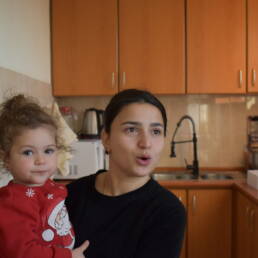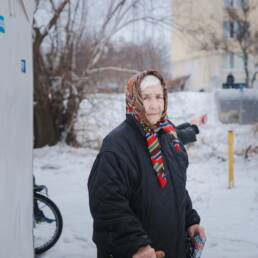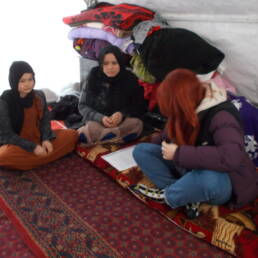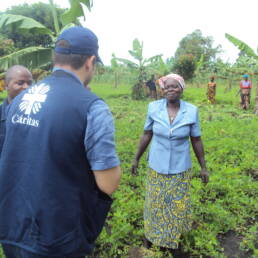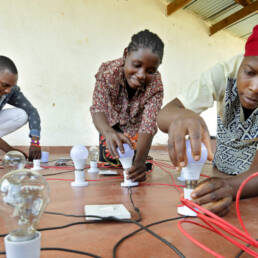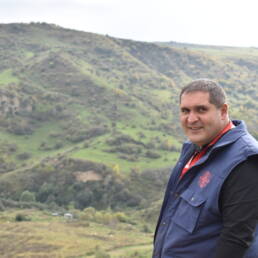Author
Anastasiia Solianyk
Communication Manager
Caritas Ukraine
The situation
According to the UN Office for the Coordination of Humanitarian Affairs (OCHA) report, an estimated 5.2 million people bear the brunt of the armed conflict in eastern Ukraine. Today, after 6 years of war crisis in eastern Ukraine, 3.5 million of the affected population of Donbass still needs humanitarian assistance due to lack of basic services, such as sufficient medical care and access to drinkable water. In addition, the region struggles with unemployment, food insecurity and limited freedom of movement. Curtailed access to social benefits and civil documentation and a lack of normative frameworks and laws combine with the conflict situation to create a humanitarian crisis.
Most people in need live in the conflict-affected Donetsk and Luhansk regions divided by the 427-kilometre-long contact line, as the OCHA reports, which is equivalent to the length of the French-German border.
In the Donbas region, 1.9 million of the people in need continue to live in non-government controlled areas and 1.5 million have moved to the area controlled by the Ukrainian government. Those who moved from the conflict, so called internally displaced persons (IDPs), often suffer from depression from dealing with the necessity to start their lives all over again, find permanent apartments and new jobs, and with memories of shelling and destruction of what were once their homes. Not willing to admit their pain, IDPs sometimes apply negative coping strategies like alcohol abuse, self-medication and overworking. Social stereotyping also particularly prevents some men from seeking psychosocial support, which can expose their families to abusive behavior.
Since 2014, over 3,300 civilians have been killed and about 7,000 injured. These numbers will continue to grow as clashes continue to take place despite an agreement on the disengagement of troops reached on 1 October during the negotiations of the Trilateral Contact Group in Minsk on the Donbas settlement.
Since April 2014, Caritas Ukraine has helped nearly 560,000 people affected by the humanitarian crisis in eastern Ukraine.
Caritas Ukraine places people in need at the heart and forefront of all its responses and is guided by humanitarian principles and Christian values. Scrupulous assessments of needs are conducted before a project begins and help is provided regardless of nationality, religion, age, gender and political background.
The work done by Caritas Ukraine since 2014 has been marked by challenges associated with the war and the continuing humanitarian crisis as a result of armed conflict. To bring effective and timely help to the victims of the war and other socially unprotected people in eastern of Ukraine, Caritas Ukraine built up its network and created more than a dozen centers in five eastern Ukrainian regions: Luhansk, Donetsk, Kharkiv, Zaporizhia and Dnipropetrovsk. From these centers, assistance is organised and coordinated to victims in the buffer zone, IDPs and other people in need. This assistance includes provision of basic needs: food, medicines and fuel materials for the winter period, as well as a range of social services.
What is Caritas Ukraine doing?
Despite the challenges brought by the war, Caritas Ukraine continues to focus on social and poverty-related issues in Ukraine and develops its priority areas: providing quality social services, such as homecare, work with children and young people in difficult living conditions, the fight against human trafficking and the prevention of other negative consequences of labor migration, and support and assistance to people with disabilities. Caritas takes an active part in the debates on social sector reforms, offering its approaches to improving social protection of citizens based on the principles of Catholic Social Teaching. At the same time, Caritas Ukraine is developing activities focused on strengthening social activity and consolidation of civil society.
From 2014-2018, Caritas Ukraine provided assistance with a number of projects and interventions, which have been of vital importance to the people in Ukraine, such as immediate crisis relief, food packages, emergency shelter, WASH support (water, sanitation, and hygiene), training and education, and integration and peacebuilding.
Water, sanitation and hygiene
With regards to WASH, over the last few years Caritas Ukraine has implemented a number of projects to help people have access to clean drinking water in and around the conflict region. In 2019, Caritas Internationalis financially supported a Caritas Ukraine project that allowed access to drinking water to more people (approximately 4,500). Thanks to this funding, Caritas Ukraine together with Caritas Mariupol launched the project “Ukraine: Emergency Response to the Crisis” for five additional locations in the buffer zone.
Particularly, on 17 December 2019, Caritas Mariupol launched a drinking water pump in Myrne. A settlement with a population of about 1,500 people, which had been living without drinking water the past years. Before Caritas stepping-in, the only way to access safe water for people there was to buy it. However, this was not financially possible for every family. At the moment, construction of pump-rooms continues in four more settlements of the contact line – Mar`inka, Krasnogorovka, Kamianka and Andriivka.
Peacebuilding
Another important aspect of Caritas Ukraine’s work for IDPs is peacebuilding. This project is aimed at restoring social coherence, trust and cooperation in communities through reconciliation and mutual understanding, which are especially important for integrating IDPs into local communities. The main philosophy of the activities foresees cooperation not with separate social groups, but with the society as a whole, and to make people aware that existing problems can be resolved jointly. Nowadays, the Ukrainian community and each separate person needs to be able to establish a dialogue with others, find possibilities for understanding, build relationships based on common values and lay the foundations for lasting peace, civic freedom and well-being. The project is implemented in Kyiv, Kamianske, Kramatorsk, Kharkiv, Ivano-Frankivsk, Drohobych, Zaporizhzhia and Odesa, because these are the locations where most IDPs live now.
In 2018, 10,859 people received accompaniment offered by the Family Integration Support Centers of Caritas Ukraine in conflict transformation and peacebuilding events, including integration visits of families from Mariupol and Berdyansk to Kolomyia and Drohobych, with 32 participants.
Unemployment
Finding a job is a huge humanitarian challenge in eastern Ukraine and for IDPs in particular. Increasing conflict-related poverty and unemployment rates affect the standards of living and pose risks to people’s health. Very often IDPs from Donetsk and Luhansk region need to change their professions, because miners, railway workers and chemists are not in high demand in the rest of the Ukrainian territory.
The biggest humanitarian challenge in unemployment is that the lack of financial resources forces IDPs to make some stark and impossible choices on whether to eat, buy medicine or send their children to school.
Caritas Ukraine had a project on employment in Kharkiv, Kramatorsk, Sloviansk, Mariupol, Zaporizhzhia and Odesa. The project included facilitation of programs for vocational development and training, the creation of possibilities for employment of IDPs willing to learn a new occupation, provision of grants for business entities to create workplaces for IDPs, provision of business grants for launching or resumption of personal businesses and restoring the livelihoods of IDPs and local citizens in rural areas of Donetsk region.
Grants for entrepreneurs include support of business start-ups and resumption of existing business on a competitive basis. The main objective of this approach is to restore the main source of income of IDPs and their financial independence. The main focus is to support micro-business initiatives (petty trading, small-scale services or production activities). Grants are issued on a competitive basis. The decision on giving the grant is taken by the contest commission after examining business plans presented by candidates. Special attention is paid to candidates from vulnerable groups.
One of Caritas Ukraine’s beneficiaries of the employment project is Alla Medvedeva – an IDP from the Luhansk region, who has lived in Odessa since 2014. Here is her story:
I have a workshop for repair and sewing of clothes, bags, and coverlets. My workshop is located in Kotovskiy village, Odessa region. I opened the workshop more than a year ago and in the first month it became profitable.
I came from Lugansk and moved to Odessa in the fall of 2014. As my life was changing, I remembered my childhood dream – to become a designer. I used to make clothes for myself and my friends, so I decided to monetise my hobby. Courses, books, exhibitions, acquaintance with people from this field, I was trying to find myself for several months. As a compromise, I chose to open a sewing workshop. My life before and after this is very different.
My biggest achievement was to finally make up my mind. Now I am really pleased to have regular customers and clients who came to me on recommendations. We try to have wider range of services in comparison to other workshops – we work with all sorts of fabrics, have a good choice of accessories and are always in time. To earn money one should not be lazy and should be ready to learn.
I am happy to be a participant in the Caritas Ukraine project. For me it was a good opportunity to lift my head from the everyday routine and try something new. I was part of very ambitious motivated group, which filled me with new energy. This was an extremely valuable thing for me together with the knowledge I gained while studying in the project.
The business development grant from Caritas Ukraine allowed me make my workshop efficient and to buy new equipment. I am so thankful to the project for believing in me and giving me a chance.
Conclusion
So, to conclude this small overview of the humanitarian situation in Ukraine over the last 6 years of conflict, it is an important reminder that the economic situation in Ukraine is still unsettling and attention to the humanitarian crisis in the east is decreasing rapidly. Humanitarian organisations here struggle to get funds in order to maintain assistance to vulnerable people on a sufficient level. However, it stimulated main actors, such as Caritas Ukraine, to develop their fundraising and level of recognition. Also, according to the research of the Ukrainian Good-Doers Association, most representatives of the humanitarian sector consider the following sources of funding to be most effective: cooperation with international donors/partners, using social networks, holding charity events and addressing the corporate sector directly. According to the same research, Caritas Ukraine is in the top five most effective public and transparent humanitarian funds in Ukraine. Caritas Ukraine strongly relies on support both from international donors and internal partners to make life for those who suffered and continue to suffer in the course of this crisis, at the very least, manageable.









